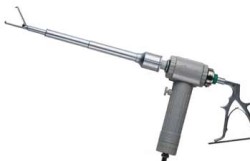Top Class Actions’s website and social media posts use affiliate links. If you make a purchase using such links, we may receive a commission, but it will not result in any additional charges to you. Please review our Affiliate Link Disclosure for more information.
Morcellation of uterine fibroid procedures offer women a less invasive version of the procedure, as well as shorter recovery time.
However power morcellation has been linked to a number of post operation complications, including the formation and rapid progression of uterine cancer.
Power morcellation can be used for a number of gynecological procedures, most commonly with myomectomies and hysterectomies.
These procedures begin with making a small incision in the abdomen, in which a small tube is inserted that will be used to suck up the uterine fibroids. Attached to power morcellation devices are two small rotating blades which are used to cut up the uterine fibroids into smaller sizes that are then pulled through the tube.
Even though power morcellation of uterine fibroid procedures have helped numerous women, these devices have also allegedly caused just as many problems.
Previously, medical experts thought that using power morcellation of uterine fibroid procedures was safe, but recent injury reports and FDA warnings have now reversed those opinions.
Morcellation of Uterine Fibroid – Risks and Dangers
The FDA released a public warning regarding power morcellation cancer in April 2014, stating women undergoing power morcellation of uterine fibroid procedures may have higher chances of developing aggressive uterine cancer.
The agency stated that when the power morcellation blades cut up the uterine fibroids, the debris spreads through different parts of the abdominal area. In the cases of undiagnosed uterine cancer, the invasive tissue is allowed to spread at a much faster rate.
There is currently no diagnostic method available to determine if a woman has uterine cancer before undergoing power morcellation surgery. It is currently estimated that one out of every 350 women who undergo power morcellation of uterine fibroid procedures have undiagnosed uterine cancer.
Even though this cancer is treatable in early stages, the cancer can become potentially fatal in late stages. While some surgeons have reported preventative success by using surgical bags to catch the debris during procedures, many hospitals have opted to ban these devices altogether.
In the midst of the growing controversy, many power morcellation manufacturers pulled their devices from the market. Johnson & Johnson’s Ethicon division stopped sales of its morcellation devices in April 2014, and eventually pulled them completely off the market several months later.
For many patients these actions came too late, and they were left to contend with the disease or watch their loved ones battle through it.
Patients who may have developed power morcellation cancer may be able to file legal action and should contact a specialized lawyer to determine eligibility.
Do YOU have a legal claim? Fill out the form on this page now for a free, immediate, and confidential case evaluation. The morcellation cancer attorneys who work with Top Class Actions will contact you if you qualify to let you know if an individual lawsuit or class action lawsuit is best for you. [In general, morcellator cancer lawsuits are filed individually by each plaintiff and are not class actions.] Hurry — statutes of limitations may apply.
ATTORNEY ADVERTISING
Top Class Actions is a Proud Member of the American Bar Association
LEGAL INFORMATION IS NOT LEGAL ADVICE
Top Class Actions Legal Statement
©2008 – 2024 Top Class Actions® LLC
Various Trademarks held by their respective owners
This website is not intended for viewing or usage by European Union citizens.
Get Help – It’s Free
Join a Free Morcellation Cancer Class Action Lawsuit Investigation
If you or a loved one were diagnosed with cancer in the uterus, pelvis or abdomen within two years of undergoing surgery for a myomectomy (removal of fibroids), hysterectomy (removal of the uterus), oophorectomy (removal of the ovaries), or salpingectomy (removal of fallopian tubes), you may have a legal claim. See if you qualify by filling out the short form below.
An attorney will contact you if you qualify to discuss the details of your potential case at no charge to you.
Please Note: If you want to participate in this investigation, it is imperative that you reply to the law firm if they call or email you. Failing to do so may result in you not getting signed up as a client, if you qualify, or getting you dropped as a client.
Oops! We could not locate your form.













